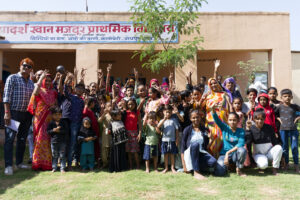School Centre at Daneshwar
The main objective of the project is to enable the children of the expatriate to get to school. Because of the need and the hard life in the quarry, the parents have other worries than to look after the education of their offspring. Especially since most adults did not attend school. They are not aware of the importance of education. For this reason, mothers and fathers must first be sensitized. They must recognize that their children have rights – rights to protection and care, to health care, to schooling, which ultimately benefits the family.
Actions and objectives of the project:
• the children of the migrant workers are offered a school offer in the immediate vicinity of the stone quarry settlement;
• around 500 families are sensitized to recognize the rights of their children, to support them and to enable them to attend school;
• the quarries included in the project become “child-free zones”;
• the children of migrant workers visit a school for the first time or are reintegrated;
• quarry workers will be informed of their rights and learn to demand them;
• the establishment of trade union structures is designed to permanently improve working and living conditions in quarries.
Background
Donor:
- Gesamtschule Gronau
- Hümmling-Gymnasium
- Private donors

